Ryan Schneider's Blog, page 8
November 7, 2015
#NaNoWriMo2015 Diary -- Day 7
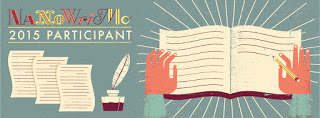
Day 7
Today was not as productive as I’d hoped it would be. Probably because it’s Saturday.
Only 2140 words written today, bringing the total to 14,676.
Hopefully more tomorrow. (Except that football is on…)
Also, there was a really “awesome” spreecast today hosted by NaNoWriMo Executive Director Grant Faulkner in which he interviewed successful YA author Marissa Meyer, who wrote CINDER and has the final book in that series, WINTER, coming out Tuesday 11/10. Here’s a screenshot I took with my phone:
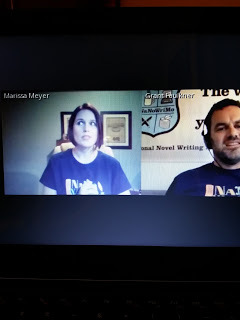
Marissa shared that her NYT bestseller CINDER was written as a NaNoWriMo novel. So that should motivate you for sure!
Marissa also matched the donations today with $5000 of her own in order to help fund this massive NaNoWriMo endeavor which has more than 400,000 writers participating, more than 2000 schools which have received Young Writers kits, and more than 1000 libraries. There are actual real meetings with real live people all over the place. You can find meetings and fellow writers near you on the NaNoWriMo website.
Be sure to follow Marissa on Twitter: http://twitter.com/marissa_meyerAnd be sure to follow Grant Faulkner on Twitter too: http://twitter.com/grantfaulkner
Keep writing, everybody. Don’t be intimidated at this point. Things are getting good!
Published on November 07, 2015 16:06
November 6, 2015
#NaNoWriMo2015 Diary -- Day 6
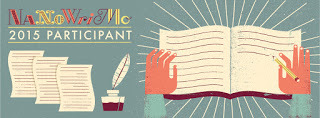
DAY 6
Today was a good day.
I reached 12,536 words before finally shifting gears to my other WIP.
I found myself outlining the scene again, the same as I did yesterday. It’s not exactly a scene so much as a period of time in the story. In this case, it’s the day after yesterday. It began in the morning with the characters eating breakfast and went through the late evening. I got to dinner when I stopped.
Also, I know exactly what the first word will be when I begin writing tomorrow because I've already outlined the scene(s). I think it was Hemingway who said to stop writing for the day when you know EXACTLY what the next word is going to be; this will make it easier to resume writing tomorrow.
The most important part is that I’m enjoying myself.
It took longer than I expected, same as it did yesterday, because I take brief breaks to go to Chrome and do a bit of research. These breaks are anywhere from one minute to about five minutes, depending on how much reading I have to do. I know a lot of writers advocate not doing this; they say not to stop to do research because you’ll get sidetracked, lose your momentum, stop writing for the day, etc. And that is a possibility. But I usually find that the piece of information I’m searching for (flavors of Ben & Jerry’s, the price of a bottle of Skyy vodka, how many orange Jeep Wranglers are for sale nationwide…) plays a key role in developing the story. Merely putting in a placeholder and coming back to it later inhibits the creative process. And it creates a stack of work to do later. I like to get my manuscript as perfect as I can while I’m writing it. I’m lazy that way in that I prefer to work really hard now and get as much done as possible in order to reduce the work required on subsequent drafts. I believe this to be helpful because at some point during the writing process all writers begin to tire of their story. It’s usually somewhere in the middle or final third of the writing of the first draft. Just ask how many writers or aspiring writers have manuscripts they began but never finished. The most important part is to have fun and enjoy writing. The second most important part is to finish what you start. You don’t learn anything unless you finish what you start.
I also earned my first 10k badge today. Yay!
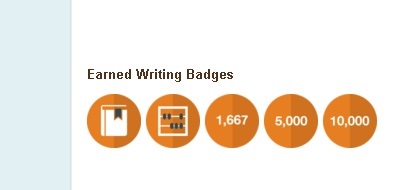
Good luck and keep up the great work!
Published on November 06, 2015 11:09
November 5, 2015
#NaNoWriMo2015 Diary -- Day 5
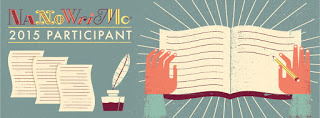
DAY 5 - Thursday, November 5, 2105
[NOTE: If you're confused because we went from the previous post (Day 2) to today (Day 5), don't be; I started NaNoWriMo2015 three days late; I decided to actually go for it and signed up on November 3rd. So my Day 1 was actually Day 3. Get it? But we're caught up now and subsequent posts will match the correct corresponding day of the competition. Thank you. We now return you to your regularly-scheduled programming.]
Wound up going long yesterday and surpassed the required 6667 word count. I reached 7597 words.
There’s definitely pressure to get this book written, achieve my word count each day, and get back to my other WIP, which is a trilogy (and probably/hopefully a series). All 4 books MUST be done and out by Christmas in time for all the new e-readers and smart phones on which people will be excited to read new novels.
Also, for those interested in the craft side of things, I found myself outlining yesterday’s NaNoWriMo scene. It involved 3 people doing stuff in one house at the same time. It took a bit of back-and-forth to see who did what and when they did it, but the outlining made things easier. And perhaps it contributed to surpassing my word count. I used to be a pantser, a writer who writes by the seat of his or her pants. But whenever I begin thinking about a new story/novel I want to tell/write, the story comes at me so fast that I really have no choice but to outline it, often messily, as quickly as possible in order to get as much of the story down as possible. Years and years ago, I read an article in Writer’s Digest Magazine written by or about Stephen King. The analogy he used at that time was one of an archaeologist unearthing fossils. The story is buried in the earth, ready to be uncovered and shared with the world. That is our job as writers. Stephen King said the more of the story he is able to unearth, the better it will be. Sometimes you use a back-hoe. Other times you’re on your knees with a little brush, trying to be as delicate as possible. The back-hoe is the outline. The little brush is moving individual words around and proofreading on the 25th read-through.
I guess the point is to try outlining if you’ve never tried it. The first draft of a story is there to tell yourself the story, right? Then you go back and fix stuff, clean it up, edit it, and proofread it, going over it about 25 times before you’re (mostly) ready to let someone else read it. Well, the outline has, for me, drastically improved that first draft experience. The reason is because while I’m outlining the story, all I’m thinking about is plot and character and story; I’m not concerned with crafting kick-ass poetic prose that would make Michael Chabon quit writing forever. Instead, I’m able to think about the STORY. Then, once I’ve reached the end of the outline and understand the whole arc of the book, I can go back and craft the prose. Because I know the story is already written down, there is no need for me to hold it all in my mind for a year the way it would be if I were writing by the seat of my pants.
This outlining process also allows one to write faster, thus one is able to write more books in the same amount of time. Imagine if you could write 3 or 4 books a year instead of one. Or maybe 5 or 6. Thriller writer Russell Blake does. He’s an indie writing/publishing MACHINE. And his writing career has blossomed because of it. The other thing is to make a writing schedule and STICK to it. NaNoWriMo is like boot camp for that very thing to be employed in one's future writing career. If you want to be a professional writer/novelist and want it to be your career, treat it as such and it will reward you accordingly. Treat it like a job you have to show up to every day. However, if you treat it like a hobby, it will pay like a hobby. And hobbies typically don't pay; they cost.
So, consider outlining as a means of improving not only your work but your experience and your ENJOYMENT of writing. Because if we’re not having fun, why do it?
Okay, back to NaNoWriMo2015.
Keep up the great work, everybody!
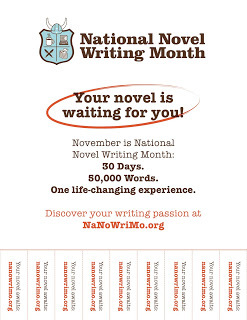
Published on November 05, 2015 05:24
#NaNoWriMo2015 Diary -- Day 2

DAY 2 (Day 4) November 4, 2015
Got about 4000 words last night. Updated the word count. It said I would be done on December something, which is not November, so I upped it to 5050 words in order to see the completion date November 30.
So today is day 4, which means I need to get to 6667.
It’s currently 11:07 a.m. Wednesday. Time to begin.
Published on November 05, 2015 05:11
#NaNoWriMo2015 Diary -- Day 1
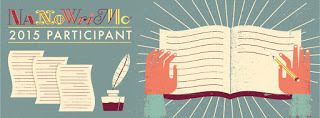
DAY 1 – Tuesday 11/3
[Note: Today is indeed November 5, not November 3 as stated above. This journal is going up a few days late because I just decided it would be a fun experiment to document my first NaNoWriMo experience. Subsequent entries will coincide with the actual day. Thank you. We now return you to your regularly-scheduled programming.]
After agonizing (well, okay, more like thinking about) whether or not to do NaNoWriMo this year, given that I’ve never done it despite having wondered about it every year at this time for the past four or five years, I decided to go for it.
I figured that I’m going to be writing my tail off anyway to get at least three new books to market by Christmas, so why not sign up for NaNoWriMo?
At this moment, I’m in the process of signing up, reading the Terms&Conditions, the FAQ, etc.Mostly, I’m trying to decide if I should use NaNoWriMo to continue with my three-book series I’ve been working on the past seven months, or dive in with a new manuscript I have mostly outlined and which I was working on before life happened and I diverted to this new series.
So, today is November 3rd. I guess that means I’m three days behind. Oh well.
In addition to settling on a project (continue WIP or begin new WIP?), I need to determine word count. The current WIP is three books (maybe four or five or more; who knows?) and at 100k each, that’s 300,000 words. I am committed to having them done by Christmas. I have about 80,000 words to go on the first draft of the third book. The first two books are written and need at least one more pass. So the hard part is almost over. I’ve outlined all three books using Rachel Aaron’s book From 2K to 10K, which helped A LOT. My word counts went from about 2000 a day to 6000-8000 a day on days I really focus, which, to be totally honest, has been difficult the past couple months; not entirely sure why.
Nevertheless, the dilemma is whether or not it is feasible to write a new novel for NaNoWriMo (the working title of the book I would write is “Rocket Man”) AND still get the trilogy to market by Christmas. It’s a TON of work.
The bold thing to do would be to simply jump in, calculate the daily word counts, and go for it.Okay, back to the NaNoWriMo sign up page…
Roughly 15 minutes later…Okay, I signed up. Rocket Man it is.Here we go.
Okay, so I have a calendar and given that this is day 3, my word count needs to be 5000.
And check out this cool flyer the kind NaNoWriMo folks made for this year. You're supposed to print it out and stick 'em up all over town.
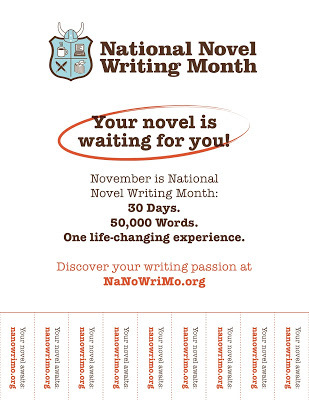
Published on November 05, 2015 05:08
November 3, 2015
10 Questions with Fantasy & Science Fiction Author Kay Kenyon (@KayKenyon)
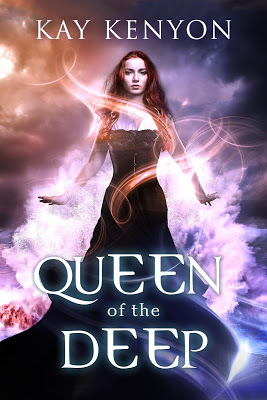
This Author Spotlightfeatures
Kay Kenyon
author of
Queen of the Deep
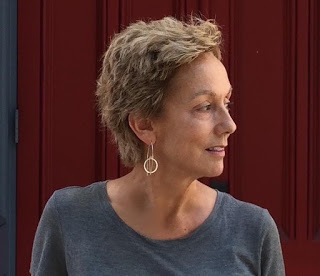 Kay Kenyon's latest novels are the fantasies Queen of the Deep, about an enchanted ship, both a colossal steam vessel and a Renaissance kingdom; and A Thousand Perfect Things, about a Victorian woman's bid for forbidden powers in an altered India of magic. Her quartet, The Entire and The Rose, was hailed by The Washington Post as “A splendid fantasy quest as compelling as anything by Stephen R. Donaldson, Philip Jose Farmer or yes, J. R. R. Tolkien." Bright of the Sky was among Publishers Weekly's top 150 books of 2007. Her books have been nominated for the Philip K. Dick award and the John W. Campbell award. She is a founding member of the Write on the River conference in Wenatchee, Washington.
Kay Kenyon's latest novels are the fantasies Queen of the Deep, about an enchanted ship, both a colossal steam vessel and a Renaissance kingdom; and A Thousand Perfect Things, about a Victorian woman's bid for forbidden powers in an altered India of magic. Her quartet, The Entire and The Rose, was hailed by The Washington Post as “A splendid fantasy quest as compelling as anything by Stephen R. Donaldson, Philip Jose Farmer or yes, J. R. R. Tolkien." Bright of the Sky was among Publishers Weekly's top 150 books of 2007. Her books have been nominated for the Philip K. Dick award and the John W. Campbell award. She is a founding member of the Write on the River conference in Wenatchee, Washington.1.How did you get into writing and why do you write?
I began writing fiction after careers in copy writing and urban planning. One seemed too superficial and one, maybe too serious. Sometimes I believe that novels have to be superficial or no one will read them, and sometimes I think that stories are crucial to sanity, empathy, and civilization as we know it. I'm enormously grateful to be in the writing life.
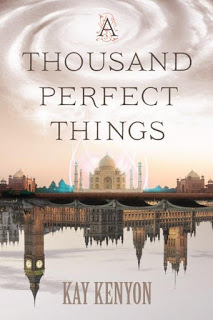 2.What do you like best (or least) about writing?
2.What do you like best (or least) about writing?My favorite moment in fiction writing is to discover, upon waking up in the morning, that my brain has been secretly working on a plot issue or snippet of dialogue, and the solution is perfect.
3.What is your writing process? IE do you outline? Do you stick to a daily word or page count, write 7 days a week, etc?
My process is that I work hard on initial concept, striving for originality and emotional go-power. Then I develop and try out big turning point scenes to see if there's enough there. Meanwhile, character profiles, including backstories, spending excruciating amounts of time finding names. Following this I briefly detail out 60 or so scenes, sort of telling myself the story. After all of this, I begin to write, and while the plot and characters (inevitably) evolve, I always know the spine of my story. When under contract, I write six days a week, 5 page daily minimum.
4.Who are some other writers you read and admire, regardless of whether they are commercially “successful?”
Ian McDonald, Joseph Kanon, David Mitchell, Naomi Novik, Haruki Murakami.
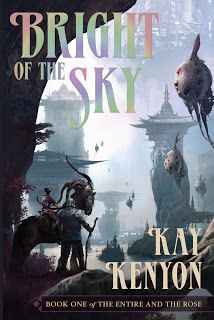 5.Should the question mark in the above question be inside or outside the quotes?
5.Should the question mark in the above question be inside or outside the quotes?Outside. No, wait...
6.What’s your stance on the Oxford Comma?
I try to care, I really do. But I change opinions depending on which outraged blog post on this topic that I've just read. It rather annoys me that a document is supposed to be consistent about Oxford. For example, if my sister is not my best friend, (alas, true) then the comma is helpful here: "I dedicate this story to my husband, my sister, and my best friend." But "Our flag is red, white and blue" is more elegant without a second comma. It must also be said that overall, comma use is exasperatingly difficult, like peeling avocados.
RYAN: This may be the best answer I've ever received to this question. Bravo, Kay!
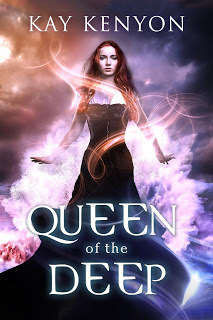 7.How did your book Queen of the Deep come about and how did it come to fruition?
7.How did your book Queen of the Deep come about and how did it come to fruition?There is an ocean, somewhere, but not earthly. A gigantic ship roams endlessly upon it. The ship embodies a small medieval kingdom. My modern protagonist is stuck on it. She is the only one that can see "overboard." Difficulties ensue, including being thought mad, running afoul of the ship's ruling deity, and falling in love with the wrong man. (Notice use of Oxford comma, in this case!)
This was my vision. Indeed strange, but I thought of it as a romp and also a meditation on love, loss, and what to wear during the Italian Renaissance. It came to fruition after I was able to wrestle the plot to the ground, always the hardest part of fiction, for me.
8.What’s your current writing project? A paranormal espionage series set in the 1930s.
9.What book(s) are you currently reading?
● Walter Jon Williams early novel, Knight Moves● The Rise and Fall of the Third Reich● Hitler's Spy Chief: the Wilhelm Canaris Mystery
10.Who or what inspires your writing?
Novelists and screenwriters who nail plot and character equally well, such as: Ian McDonald, CJ Cherryh, Alistair Reynolds, Kim Newman, and writers for such shows as Public Morals, The Americans, and Wolf Hall.
Finally, is there anything you’d care to add?
You can check out my books on my website. Some of my books are available at brick and mortars, and all can be found at online retailers. Signed copies at A Book for All Seasons.
Thank you, Kay, for sharing your work and your insights into craft with us. Quite an impressive resume. Please come come back and share the first installment in your paranormal espionage series when it is ready.
Be sure to visit Kay's website to view more of her work. And follow her on Twitter.
Click HERE to read about Kay's Philip K. Dick Award-nominated book Maximum Ice, which I featured previously as part of the Philip K. Dick Award Storybundle.
Stay tuned for our next Author Spotlight, featuring another very special author.
Published on November 03, 2015 10:16
October 26, 2015
10 Questions with World Fantasy Award-winning Author Lewis Shiner (@lewisshiner)
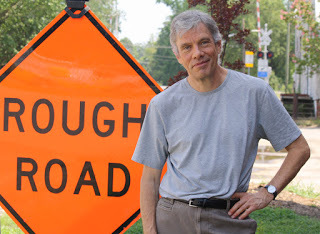
This Author Spotlightfeatures
Lewis Shiner
World Fantasy Award WinnerandAuthor of Seven Novels
Exciting news, gang: a brand new round of Author Spotlights is on its way, featuring a number of accomplished and talented writers.
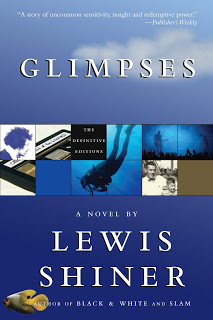 The first of these is Lewis Shiner. Lewis Shiner is the author of BLACK & WHITE, FRONTERA, and the World Fantasy Award-winning GLIMPSES, among other novels. He's also published four short story collections, journalism, and comics. Virtually all of his work is available for free download at www.fictionliberationfront.net.
The first of these is Lewis Shiner. Lewis Shiner is the author of BLACK & WHITE, FRONTERA, and the World Fantasy Award-winning GLIMPSES, among other novels. He's also published four short story collections, journalism, and comics. Virtually all of his work is available for free download at www.fictionliberationfront.net.1.How did you get into writing and why do you write?
I've been writing fiction since I was four and started my first novel at seven, so it's hard to remember exactly what prompted it. I got uprooted a lot as a child (my father was in the National Park Service and we moved at least once a year), so books were one of the few constants in my life. I expect that's why I came to love them and want to write them myself.
As to why I write, that's changed over the years. Initially I wrote to be rich and famous. When that didn't work out, I came to discover that it was an innate need, a way to process the events of my life and my feelings about them.
2.What do you like best (or least) about writing?
First drafts are the hardest, especially the early stages, because that's when I create the scaffolding that has to support everything else. I retype everything at least once and sometimes twice, and that second draft, when I'm retyping the rough work of the first draft and smoothing it out--the hard work of craft as opposed to the undependable magic of inspiration--is my favorite part. I also find that my first drafts are more and more polished, so the rewriting is less work. I've gotten to where I don't like finishing anything, because that's when my grandiose dreams for a project run up against the real world.
3.What is your writing process? IE do you outline? Do you stick to a daily word or page count, write 7 days a week, etc?
I used to outline, but more and more I just take my head full of vague ideas and start typing. That way my characters can surprise me and the plot can develop more organically.
I have a day job and a full life, so I don't always manage to write every day, but I try. I don't have any artificial goals that I set for myself--I just write as much as I can. I enjoy the process and I know that my whole life is better when the work is going well, so that's incentive enough to write. Weekends are my most productive time.
4.Who are some other writers you read and admire, regardless of whether they are commercially “successful?”
From the past: Dickens, Tolstoy, Eliot, and Conrad. Current writers I really admire include Ann Patchett, Barbara Kingsolver, Jane Smiley, and Karen Joy Fowler. I also love a good UK police procedural, of which my favorite practitioner is Barry Maitland.
5.Should the question mark in the above question be inside or outside the quotes?
Outside. The question mark refers to the sentence as a whole, not the contents of the quotes.
6.What’s your stance on the Oxford Comma?
The Oxford (aka "serial") comma is the only way to go. Omitting it, like so many other rules in the AP Style book, hearkens back to the 19th century when every comma literally cost money. The Chicago Manual of Style has completely overshadowed AP Style.
7.What are your books about and how do they come to fruition?
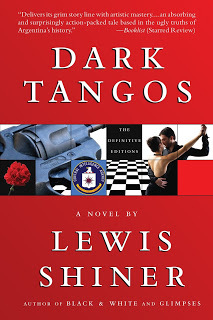 Well, I've got seven novels and a career-retrospective short story collection in print, and they're all pretty different. They range from hard SF (FRONTERA) to mainstream regional comedy (SLAM) to subjective time-travel (GLIMPSES and DESERTED CITIES OF THE HEART) to rock and roll realism (SAY GOODBYE) to mystery/suspense (BLACK & WHITE, DARK TANGOS).
Well, I've got seven novels and a career-retrospective short story collection in print, and they're all pretty different. They range from hard SF (FRONTERA) to mainstream regional comedy (SLAM) to subjective time-travel (GLIMPSES and DESERTED CITIES OF THE HEART) to rock and roll realism (SAY GOODBYE) to mystery/suspense (BLACK & WHITE, DARK TANGOS).The best metaphor that I've been able to come up with for my gestation process is that of a sieve. The intersection of a number of ideas forms a kind of mesh, and bits of other things start to get stuck in it--characters, scraps of dialog, visual images, and so on. If a lot of stuff clumps up in the sieve, then I've got a novel. If it's only a few bits, it may be a short story or nothing at all.
8.What’s your current writing project?
For the last five years I've been working on a gigantic mainstream novel about the sixties with the working title OUTSIDE THE GATE S OF EDEN. Hundreds of characters, starting in 1965 and going to 2020, set mostly in Texas, but also San Francisco, New York, rural Virginia, Tupelo, New Orleans, and Guanajuato, Mexico. It's currently over 350,000 words, and I'm finally closing in on the end. It attempts to answer the question: What happened to the idealism of the sixties and how did we end up with the greed-based culture of today?
9.What book(s) are you currently reading?
I just finished Sara Gran's CLAIRE DeWITT AND THE CITY OF THE DEAD, which I loved, and THE BASTARDS' PARADISE by Kathe Koja, which is astonishingly well-written. I'm currently reading travel guides to Madrid for an upcoming vacation.
10.Who or what inspires your writing?
It's a question of following my passion. Anything can set me off--a song, an article on the Internet, a passage in the Times Book Review, an argument with a friend. The trick is recognizing that flash of interest, seeing the possibilities in it, and knowing how to convert that passion into the framework for a story.
Finally, is there anything you’d care to add? Please also include where people can read your published stories, buy your book, etc.
All of my novels are in print and available as trade paperbacks or ebooks through Amazon, Barnes and Noble, etc. All of my short fiction is online at fictionliberationfront.net.
Thank you, Lewis. An impressive body of work worth reading. Let us know when that epic novel is ready.
Be sure to visit Lewis's website to read his work. And follow him on Twitter: @lewisshiner
And keep your eyes open for forthcoming interviews with equally-talented writers.
Published on October 26, 2015 08:43
October 23, 2015
There Grammar Matters!
Grammar matters?
Where?
There?
Here?
Everywhere!
Wait, whose grammar?
Their's?
Over there?
Never mind, they're over there, practicing their grammar.
Seriously, though, how is it that in the Information Age (where we all are and have been for nigh 20 effing years), the need to write has increased yet the ability to write has decreased? Want to make yourself insane? Read the comments on virtually any YouTube video. How the hell are we even able to understand one another?
Consider the following:
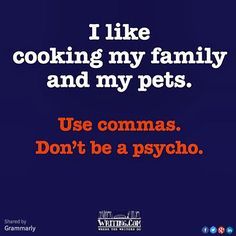
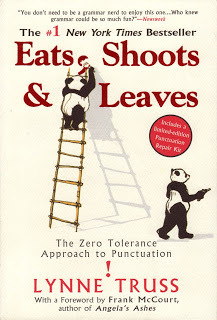
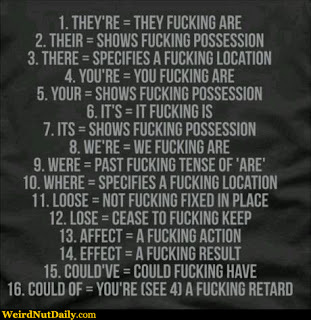
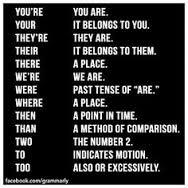
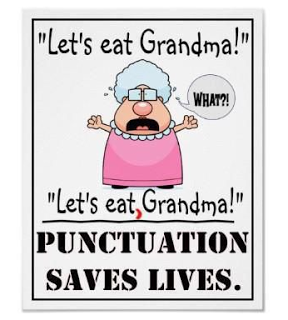
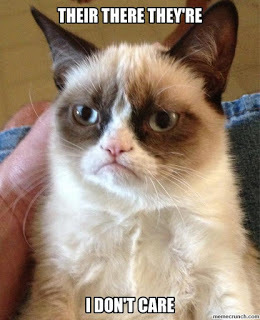
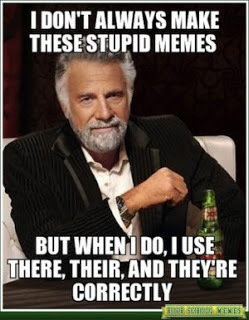

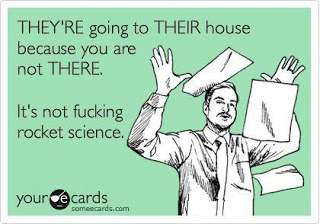
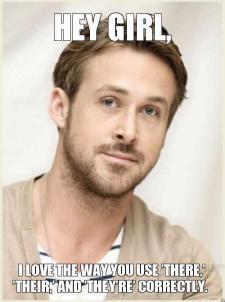
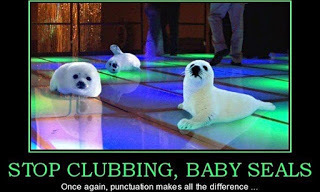
And because I can never have enough Ryan Gosling Hey Girl memes...

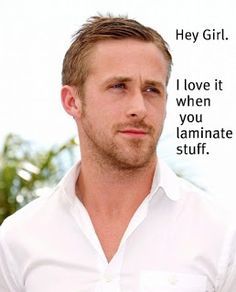
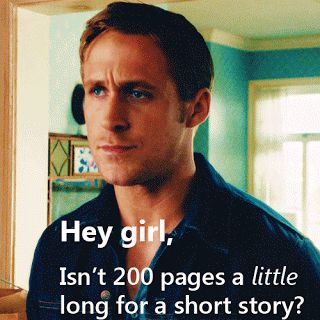
Where?
There?
Here?
Everywhere!
Wait, whose grammar?
Their's?
Over there?
Never mind, they're over there, practicing their grammar.
Seriously, though, how is it that in the Information Age (where we all are and have been for nigh 20 effing years), the need to write has increased yet the ability to write has decreased? Want to make yourself insane? Read the comments on virtually any YouTube video. How the hell are we even able to understand one another?
Consider the following:











And because I can never have enough Ryan Gosling Hey Girl memes...



Published on October 23, 2015 14:40
October 22, 2015
Did You Watch Back to the Future on Back to the Future Day?
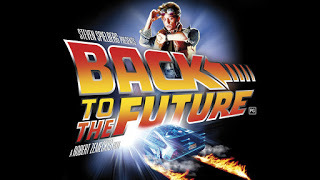
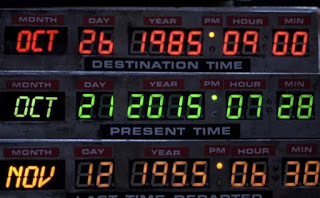 The historic day has come and gone.
The historic day has come and gone.October 21, 2015.
A long time in the making.
It was a fascinating opportunity to compare science fiction with science fact. For example, no flying cars yet. But we're also not still using fax machines. Much.
What are your predictions for the future?
Thirty years from now?
Humans routinely living and working on Mars?
Jurassic World? With people bored by the run-of-the-mill T-Rex?
The Singularity? aka the point at which Artificial Intelligence surpasses human intelligence? And if we apply the Turing Test, which asks you to discern whether you're communicating with a person or a computer A.I., we already have such machines. Refinement and evolution is inevitable.
Such was my fascination that I wrote my novel Eye Candy. Inspired by the work of Isaac Asimov, it's a hoot. With an ensemble cast and an exciting story, as many Easter eggs as Ready Player One, and a bang-up ending, it's worth a read. Check it out:
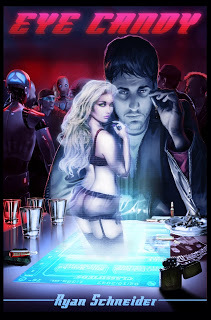
www.bit.ly/EyeCandyNovel
Published on October 22, 2015 16:48
October 17, 2015
When You Put Your Heart and Soul Into Your Writing
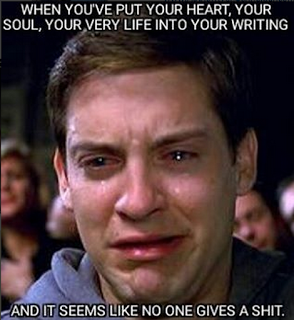
THAT is when you absolutely positively MUST remember that you write for yourself first. That's why first drafts are so much fun.
One time at UCLA one of my screenwriting professors said, When you write yourself into a corner, change corners.
So when you're struggling to find inspiration, and it happens to all of us, try to find a way back.
Try thinking about all of us fellow writers out there... banging away at our keyboards.
Try reading the first few pages of one of your favorite books.
Try watching a beloved movie, perhaps one about writers.
Try this writing exercise: set the timer on your phone for 10 minutes. Grab any book at random. Close your eyes. Open the book to any page and put your finger down. Open your eyes. Read the sentence your finger is on. That is your opening sentence. Open a new document. Type that sentence. Start your timer and WRITE AS FAST AS YOU CAN WITHOUT STOPPING. Whatever comes through is what was supposed to come through. Because you're free to write anything, and not all up in your head about character and plot and diction, you're free to create. Let it flow. It will. Whatever it is. This is a warm-up exercise. It doesn't matter what you type. It doesn't matter what you misspell. Write All work and no play makes Jack a dull boy for 10 minutes if you must. But whenever I do this exercise, the timer goes off all of a sudden and I have no idea 10 minutes have already passed. I typically silence the timer and continue writing. Several of my favorite short stories were a direct result of this exercise.
And, if you're unable to gather the strength for even this, know that that is okay too. You may not write for a week. You may not write for a month. You may not write for a year. It may take time. Sometimes you have to wait.
But don't suffer alone. Get on Instagram. Join or create a writers group. Find community. Writing is a solitary activity. But the love of writing and of books makes you a member of a unique family unlike any other. We all know what it's like. We all procrastinate. We all struggle with reconciling the excitement with the fear. We all sometimes have to make just one more mug of coffee. You can do it.#writers
Published on October 17, 2015 14:08



